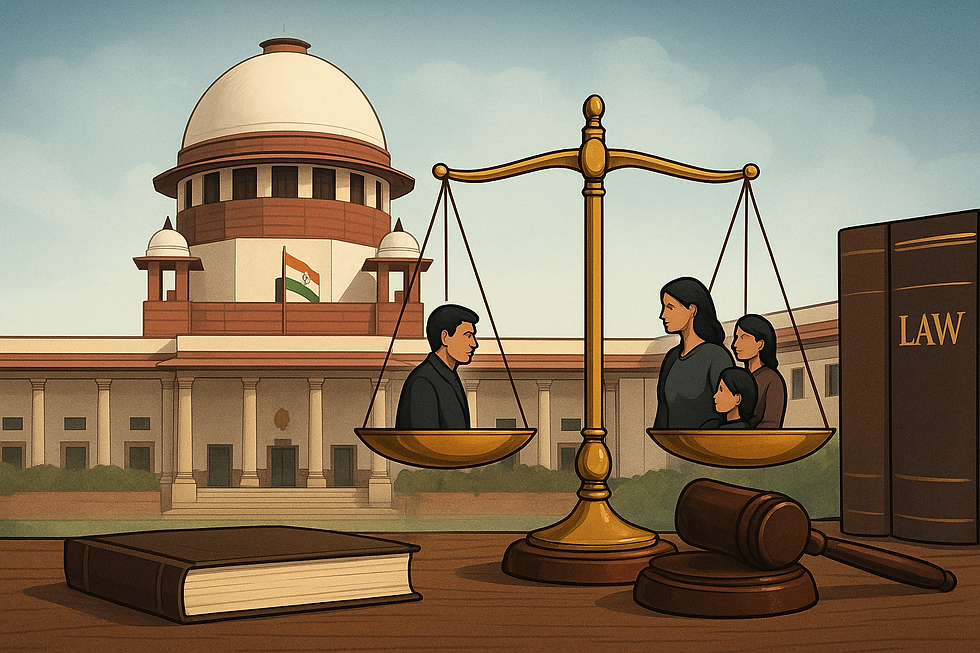Supreme Court Expands Victims’ Right to Appeal in Criminal Cases
- Lawttorney.ai

- Sep 4, 2025
- 3 min read
Context – A significant change in Criminal Law:
For decades, the focus of criminal justice in India has been on protecting the rights of the accused, ensuring unbiased trials, and preventing wrongful convictions.
Last week, a judgment was delivered by a bench comprising Justices B.V. Nagarathna and K.V. Viswanathan, confirming that victims have the same right to appeal as the accused, under Section 374 of the CrPC—now Section 415 of the Bharatiya Nagarik Suraksha Sanhita (BNSS), 2023.

Expanding the definition of “Victim”:
The expansion of the word “Victim” used by the court plays a vital role in the ruling regarding filing the appeal. The decision made it clear that:
Victims of crime not only include the affected person but also all the lawful successors.
If the victim who has filed an appeal dies during the pendency, the legal heirs can continue the prosecution.
This understanding guarantees that justice is not impeded by a victim's death and stops accused individuals from evading responsibility due to procedural errors
Limiting rights to appeal:
Earlier, only the State or the complainant had the right to appeal against the acquittal of an accused by the High Court or the trial court.
Justice Nagarathna, in her bench opinion, highlighted that this restriction contradicted the essence of justice. The ruling recognises that victims are key participants in criminal cases and should not be marginalised during the appeals procedure.
The Court’s key observation:
The court observed that only the convicted person enjoys the right to appeal under section 374 of the CrPC (now Section 415 of The Bharatiya Nagarik Suraksha Sanhita (BNSS), 2023); victims must also be granted the right to appeal under Section 372 (proviso) CrPC (now Section 413 of The Bharatiya Nagarik Suraksha Sanhita (BNSS), 2023).
Statement by Justice Nagarathna:
“The right of a victim of a crime must be placed on par with the right of an accused who has suffered a conviction.”
The Court further emphasised-
Appeal can be filed by the victim against the acquittal.
They can also appeal for convictions of minor crimes and insufficient compensation granted by the court.
This right should not be limited by procedural obstacles such as special leave conditions outlined in Section 378(4) CrPC, now Section 419(4) of The Bharatiya Nagarik Suraksha Sanhita (BNSS), 2023, which pertains to complainants and the State.
Strengthening the role of Victims in Criminal Justice:
The significance of the rights of the victims in criminal cases has been highlighted by the previous Supreme Court’s decision and Law Commission reports.
The perspectives of the victims must hold the same significance in the appeal process because the victims are probably the ones most affected by crime. The acknowledgement enhances India’s Criminal Justice system.
Why This Ruling is Significant
Equality of Rights: Victims and accused now hold equal status in appellate processes.
Access to Justice: Victims are no longer solely dependent on the State to file an appeal.
Enhancing the Rule of Law: Empowering victims makes justice more comprehensive and inclusive.
Procedural Fairness: The judgment removes technical barriers and ensures smooth access to appellate remedies.
Broader Implications of Criminal Law:
The verdict is expected to have significant implications.
-A rise in appeals has been noticed by the court filed by the victims and their families.
-Trial Courts and High Courts might be aware that victims have options to contest their ruling solely.
Way Forward – A step towards inclusive Justice:
In the Indian criminal law, it is officially recognised that victims' equal rights in appeal signify a fundamental change. By broadening their rights of minor convictions and improper and insufficient compensations, the court has stated equality in the scale of justice.
Empower Your Legal Practice with AI – Join Our Free Webinar!
Are you a legal professional looking to boost your efficiency and stay ahead in a competitive field? Discover the power of Lawttorney.AI – the cutting-edge tool designed to streamline legal research, automate tasks, and enhance productivity.
👉 Don't miss out! Reserve your spot in our FREE webinar and experience the future of legal practice today. Register Now




Comments